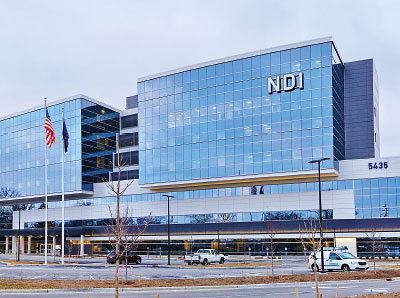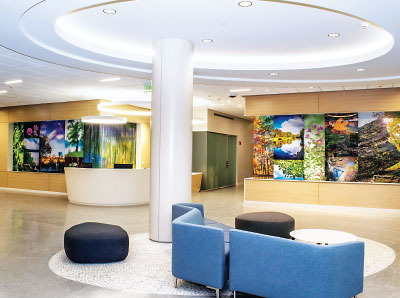Indiana’s New NeuroDiagnostic Institute Offers State-of-the Art Care
Abstract
Indiana’s new state psychiatric hospital offers rapid, cutting-edge diagnostics and treatment and teams who collaborate with patients’ local mental health professionals.
People who have complex physical and neuropsychiatric illnesses face two main challenges in getting adequate care: the revolving door of the emergency department and, for inpatients at psychiatric hospitals, the need for transportation to other facilities to treat comorbid conditions like heart disease, diabetes, or kidney disease. The Indiana NeuroDiagnostic Institute and Advanced Treatment Center (NDI) in Indianapolis, a $120 million, state-of-the-art, 159-bed facility that opened in March, addresses these challenges.

The Indiana NeuroDiagnostic Institute and Advanced Treatment Center offers advanced evaluation and treatment for patients with complex neuropsychiatric illnesses.
NDI is a state-owned facility that is the focal diagnostic center for the state’s six mental health facilities and provides treatment for patients with acute and chronic mental illness, substance use disorders, intellectual and developmental disabilities, traumatic brain injury, and neurodegenerative illnesses such as Alzheimer’s disease. Patients are referred to the hospital from community mental health centers, other state psychiatric hospitals, and judicial partners.
At a ribbon cutting for the new institute, chief medical officer Jerry Sheward, M.D., said “its design is based upon a rather simple premise that an integrated approach to treating the whole individual with precision medicine techniques and increased treatment intensity will decrease the time to recovery for many of our patients and therefore increase access to this level of care for all Hoosiers that need it.”
The institute is physically connected to Community East Hospital, which can provide care for patients’ other health needs. NDI is outfitted with six telemedicine suites for patient treatment and consultation with other health care professionals across the state, and NDI teams support their patients’ local mental health professionals when their patients are discharged.
“Historically these patients get medications to control acute symptoms, get discharged prematurely, lapse in treatment, and end up back in the emergency room,” said John Wernert, M.D., M.H.A. Wernert, a geriatric psychiatrist, served as secretary of the Indiana Family and Social Services Administration when Vice President Mike Pence was the state’s governor and NDI was first conceived. “This recidivism is what medical providers think psychiatric patients do, when most of the time it’s that we’re not treating the right condition. Here they will get answers and advanced evidence-based treatment.”
Wernert and his fellow members of the Indiana Psychiatric Society were instrumental in making the case for NDI and providing input into the kind of care the facility should offer. As physicians, they knew it would be wise to build the facility where inpatients could get other health care.

NDI’s interior was designed to be welcoming and provide a safe environment for patients, with no hard edges.
“It only made sense that people with medical needs like sleep disorders, oncology services, or dialysis could be able to do it right there,” said Wernert, who is a former APA trustee and former head of APA’s political action committee. “That’s a big change from most state psychiatric hospitals that may have staff there for basic care, but not complex problems like cardiac or renal.”
Wernert added that NDI also made financial sense. “NDI is attached to a tertiary care hospital, where we can purchase specialty services and imaging as we need them. The taxpayer isn’t on the hook for extra equipment we don’t need or for transporting patients across town [to get other types of medical care].”
This resonated with Pence, who supported the idea, but advocates for the new hospital—a broad coalition that included National Alliance on Mental Illness Indiana, Mental Health America, state medical associations, county medical societies, and the Indiana Council of Community Mental Health Centers Inc.—needed to convince the state legislature.
“We had many legislators who were supportive, but others asked why we needed this, saying we’ve got plenty of underutilized facilities out there. But the problem was that mental health services at other hospitals and health systems were designed to meet the health systems’ acute needs and not the community’s long-term needs,” Wernert said. So, the advocates explained that the hospital would be more than a new building: It would incorporate collaborative care and progressive treatment.
“It’s pennywise and pound foolish to say we don’t need a new, rapid throughput psychiatric institute when, in fact, we’ll end up saving a lot of money because patients will get the care they need, stay out of the hospital, and won’t develop worsening medical conditions,” Wernert said.
Wernert said that it takes teamwork to be successful in advocating for community mental health resources for patients.
“It’s tough for the state legislatures, who have to prioritize funding for Medicaid, education, and roads when budgets are shrinking, but this is where APA is so important,” Wernert said. “Our success in Indiana can happen in other states if district branches have meetings together and focus on their communities’ needs. We have to come together and pull in the same direction, or we’ll never make progress in improving access and care.” ■
More information on NDI can be accessed here.



